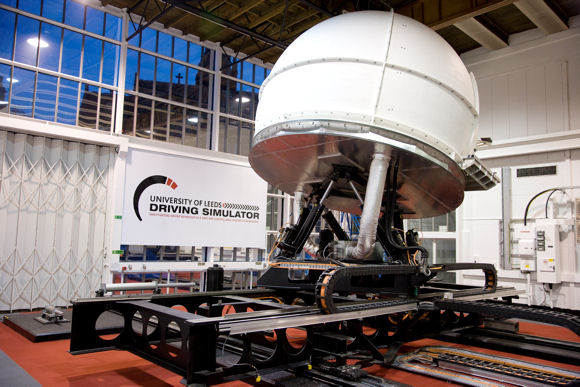Car Simulator (UoLDS)

Launched in 2006, the University of Leeds Driving Simulator (UoLDS) continues to be one of the most technically advanced driving simulators in use within a research environment anywhere in the world today – and by far the most advanced in the UK.
Using funding from UK and European government grants and industry, the UoLDS is used to study the interaction of drivers with new technologies, typically before they are fully implemented on roads and in the vehicle. Realistic and repeatable scenarios allow studies on driver behaviour to be conducted in a safe and controllable environment, substantially reducing the costs associated with the development of real systems, infrastructures or prototypes.
Features of the UoLDS:
- A realistic and familiar driving environment to enhance the illusion of driving a real car
- Tactile and haptic feedback through the pedals and the steering wheel to replicate forces experienced during driving
- Immersed in a large Virtual Reality dome with a wrap-around projection of a driver’s eye view of the virtual world being driven
- Longitudinal and lateral movement via a “hexapod” motion base and X-Y table that together provide a realistic perception of motion
- Eye-tracking and other psychophysiological metrics can be used in the vehicle cab to continuously monitor the driver’s viewing direction and measure driver physiological status.
Research opportunities:
The biggest challenges currently being addressed using the UoLDS relate to the emergence of Autonomous Vehicles – and the need to simulate both the AV (as a virtual prototype) and to study driver behaviour at higher levels of vehicle automation. Together, this will contribute to the accelerated but safe introduction of AVs.
UoLDS already has a twenty-year pedigree for executing high impact research projects, including:
- Driver situational awareness when using automated vehicles
- Driver motorway lane change decision-making processes
- Using simulation for virtual vehicle prototyping
- The effect of stress and fatigue on driver behaviour
- Driver distraction and response to critical events
- Development of driver-friendly Ecodriver systems.
Results from studies conducted in the UoLDS have had a substantial influence on National and International policy. For example, research on the simulator has shaped the understanding of how driver distraction affects road safety, providing guidelines for the implementation of speed advisory systems. The UoLDS system has been used to help car companies improve the handling and feel of their vehicles (a competitive advantage for UK and EU companies and researchers). To see our research visit our Current research and Previous research pages.
For further information visit Work with us or contact Professor Natasha Merat at n.merat@its.leeds.ac.uk
